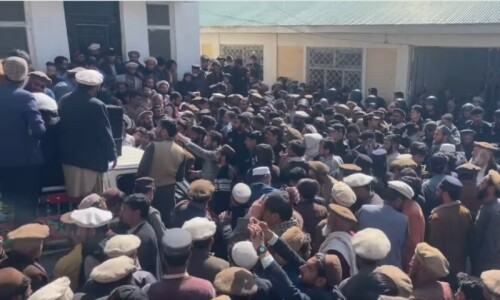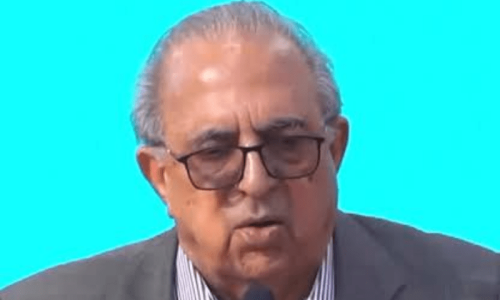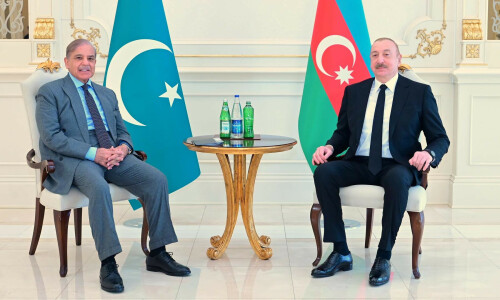
Suneet Singh Tuli believes his invention can level the playing field for children in developing countries. Mr. Tuli’s $50 tablet computer, which runs on the Andriod operating system and is charged by a built-in solar charger, in four hours, can expose children in developing countries to the same resources enjoyed by others in the developed world. More importantly, he is willing to build and distribute his tablet computers in Pakistan.
A laptop in the hands of every school going child seems like an impossible goal, especially when its price exceeds the monthly, and in some cases, the annual household income. This has contributed to the great digital divide between the rich and the poor. Mr. Tuli’s tablet computers (named Aakash by the Indian government, and commercially sold as ‘UbiSlate’ by Datawind) can help bridge the divide. Governments in developing countries (in Pakistan, read Shahbaz Sharif) should take note.

Millions of children in Pakistan who should be in school are not. Those who are fortunate to attend schools are receiving inadequate education with teachers imparting a curriculum laced with errors. The Internet, the world’s largest library, allows learners to research and have a second opinion on curriculum. A $50 tablet computer can put a library in reach of hundreds of millions in the developing world.
Mr. Tuli’s company, DataWind, aims to disrupt the education landscape for the three billion at the bottom of the pyramid. I met him earlier in the week when he visited Ryerson University. “I am willing to build the laptop in Pakistan to provide local economic benefits, in addition to making an affordable technology available to the next generation of learners”, he told me. DataWind supports domestic manufacturing in countries that adopt its products.
With endorsement from the UN for his award winning innovation, one would think that governments will be queuing up to get this product in the hands of learners. Surprisingly, only a dozen or so countries have done so to date. It appears that bureaucracies in developing countries have decided to stand between the opportunities and those hungry for learning and scholarship.

Mr. Tuli, a civil engineering graduate from the University of Toronto, grew up in Alberta. Between him and his brother, they hold several patents that are likely to create many more innovative solutions for learners. His motivation for his tablet computer: “I want the same opportunities for other children that I have for mine.”
Many have erroneously compared Aakash with the iPad and other more expensive laptops and have then come up with a long list of what Aakash may not be able to do. Such comparisons are misplaced, to say the least. First, Aakash is not designed to be the iPad killer. Instead, it is designed to put affordable computing in the hands of those who will otherwise have no chance of getting on the information highway. Second, iPad and its competitors are designing products for the conspicuous consumers where profit is the primary motive. Aakash is aimed at improving literacy across the globe.
The other part of the learning puzzle is access to the Internet. That’s where the governments can play their role. Why not revive libraries as a learning resource for the masses. Make education a priority and put in place a library for every 200,000 people. Instead of stocking shelves with books, the libraries should provide seating space, electricity, inexpensive Internet, and tablet computers on loan to be used within the library.
Every library in the public school system, though few exist, could be used for the purpose. At the same time, space could be repurposed from public schools and colleges for the same. Even the private sector could be mobilised to build libraries that the government can partly subsidise and the rest can come from user fees.
Mr. Tulli’s DataWind is working on solutions to provide cheap Internet. Their research team in Canada has devised methods to reduce network load and improve speed by 10-times for mobile network data.
Despite their demonstrated success with innovation, Mr. Tuli and Aakash have their supporters and detractors. However, Mr. Tuli or Aakash should not be the focus. Instead, the focus should be on providing quality education through innovative means to those who cannot do so otherwise.
An affordable tablet computer for the average household has a far greater chance of improving learning than the pricey laptops provincial governments have been doling out in Pakistan. With technologies like Aakash, the sky comes closer to those who want to reach it.
Murtaza Haider is a professor of Real Estate Management at Ryerson University and a Director of Regionomics Inc. He is also a syndicated columnist with Post Media and writes a weekly column on urban economics in Canada. He is the author of the book Getting Started with Data Science: Making Sense of Data with Analytics.














































